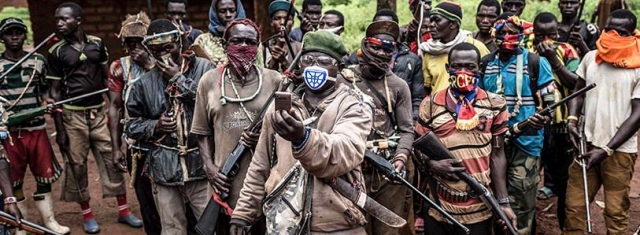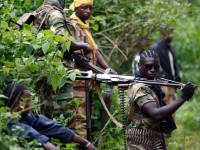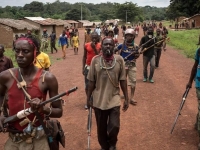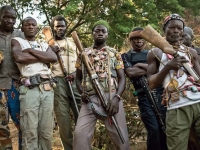News
UN SECURITY COUNCIL EASES ARMS EMBARGO ON CENTRAL AFRICAN REPUBLIC
UN SC Press Release

(Source: Photo, Alexis Huguet | AFP)
ARAC International Global Media Partners -
SC/14991
9105TH MEETING (PM)
The Security Council today extended its arms embargo against the Central African Republic — as well as a travel ban and assets freeze imposed on certain individuals and entities, as designated by its sanctions committee — for one year, eased some of the embargo’s restrictions and renewed for 13 months the mandate of the Panel of Experts tasked with assisting that body.
Adopting resolution 2648 (2022) under Chapter VII of the United Nations Charter by a vote of 10 in favour to none against with 5 abstentions (China, Gabon, Ghana, Kenya, Russian Federation), the Council decided to extend until 31 July 2023 the measures obliging all Member States to take steps to prevent the supply, sale or transfer of arms and related materiel — as well as technical assistance, training, financial or other assistance related to military activities.
9105TH MEETING (PM)
The Security Council today extended its arms embargo against the Central African Republic — as well as a travel ban and assets freeze imposed on certain individuals and entities, as designated by its sanctions committee — for one year, eased some of the embargo’s restrictions and renewed for 13 months the mandate of the Panel of Experts tasked with assisting that body.
Adopting resolution 2648 (2022) under Chapter VII of the United Nations Charter by a vote of 10 in favour to none against with 5 abstentions (China, Gabon, Ghana, Kenya, Russian Federation), the Council decided to extend until 31 July 2023 the measures obliging all Member States to take steps to prevent the supply, sale or transfer of arms and related materiel — as well as technical assistance, training, financial or other assistance related to military activities.
The Council also laid out a series of conditions in which these measures shall not apply, including supplies intended solely for the support of, or use by, the United Nations Multidimensional Integrated Stabilization Mission in the Central African Republic (MINUSCA) and the European Union training missions deployed in the Central African Republic, French forces under the conditions provided by paragraph 56 of resolution 2605 (2021), and other Member States’ forces providing training and assistance as notified in accordance with paragraph 1 (b) of the text. The Council asked MINUSCA to report on the contribution of these measures to the country’s process of security sector reform.
It also decided the measures shall not apply to supplies brought into the Central African Republic by Chadian or Sudanese forces solely for their use in international patrols of the tripartite force, established on 23 May 2011 in Khartoum by the Central African Republic, Chad and Sudan, in order to enhance security in the common border areas. Supplies of non-lethal military equipment, intended solely for humanitarian or protective use, and related technical assistance or training, as notified to the 2127 Sanctions Committee are also exempted.
In term of notification requirements, the Council decided supplying Member States or organizations must inform the 2127 Committee in advance of delivery or assistance. However, unlike its previous requirement of at least 20 days advance notice — the Council did not specify a timeframe for notification in the new text.
In term of notification requirements, the Council decided supplying Member States or organizations must inform the 2127 Committee in advance of delivery or assistance. However, unlike its previous requirement of at least 20 days advance notice — the Council did not specify a timeframe for notification in the new text.
In addition, the Council requested the Panel of Experts — whose mandate it renewed until 31 August 2023 — to provide it with a midterm report, no later than 31 January 2023, and a final report, no later than 30 May 2023, as well as progress updates as appropriate.
Strongly condemning attacks committed by armed groups of the Coalition des patriotes pour le changement, the Council further asked the Panel to consider proposing or updating further statements of cases for possible designation pursuant to paragraphs 20 to 21 of resolution 2399 (2018).
Strongly condemning attacks committed by armed groups of the Coalition des patriotes pour le changement, the Council further asked the Panel to consider proposing or updating further statements of cases for possible designation pursuant to paragraphs 20 to 21 of resolution 2399 (2018).
After the vote, Sylvie Baïpo Temon, Minister for Foreign Affairs of the Central African Republic, explaining that the 2013 arms embargo on Government forces is of “extreme importance”, congratulated the Council on the energy used to discuss the text. She welcomed its adoption as a first step and encouraged the Council to consider how it can be applied to armed groups. She thanked those States that recognized the injustice and inefficiency of the embargo on Government forces, expressing their support for its complete lifting. In particular, she thanked China, which called for considering realities on the ground, and the imbalance between Government and rebels, the Russian Federation, which has been constant in its support, as well as Gabon, Kenya and Ghana, whose solidarity and support has been illustrated today.
This is an African dossier, she said, recalling that the Central African Republic is at the geographic heart of the continent and that the fight for independence was led by its founding fathers. The position, supported by the “A3”, is aligned with all African organizations, including the African Union Peace and Security Council, which called on the “A3” [Kenya, Gabon, Ghana] for solidarity. She welcomed progress in deleting the idea of limitation of access for legitimate Government forces to some categories of weapons, allowing sufficient equipment to be provided to allow for security sector reform. Today’s text no longer stipulates an arms embargo — but possibility for its forces to have good equipment through notification to the 2127 Sanctions Committee.
Recalling that the arms embargo has been in place for nine years, she said it is a major issue for the people of the Central African Republic. “This voice is often not listened to,” she said. However, the Central African Republic is “staying the course” in its noble mission to express the injustice suffered by 5 million people. She recalled that the embargo was put in place following the Séléka rebellion, the Government’s abandonment of vulnerable people and urgent need to stop the haemorrhaging of arms. However, the embargo is no longer justified — unless the Council wants to leave the country in the hands of extremists. It no longer offers solutions to arms proliferation. She called for a complete lifting, a recognition of the efforts made by the Government.
Speaking after the vote, Wadid Benaabou (France), welcoming the adoption, said that, from the beginning, the arms embargo’s goal was to reduce the threat of armed groups in the Central African Republic. The Council has always supported the Government forces being properly equipped, he said, recalling that they received more than 20,000 weapons and 29 million ammunitions in the last few years. The Council is now facilitating further steps that allow the Central African Republic forces to obtain all types of weapons and ammunition. This is a strong message to the Central African Republic. More so, everyone's priority must remain the peace process, he stressed, adding that the peace agreement and the Luanda road map are the only hope for stabilization and lasting reconciliation.
Dai Bing (China), noting the continued improvement and progress in the Central African Republic, said that the arms embargo was increasingly incompatible with the realities on ground. Further, the Government repeatedly called for the embargo to be lifted. Spotlighting regional support for the lifting of the arms embargo, he said that the Government will be able to strengthen its capability and lay a solid foundation for peace and security. He also noted that there was still resistance in the Council regarding countries’ legitimate concerns regarding sanctions, and he called for a review of arms embargos.
Martin Kimani (Kenya) welcomed that some of his delegation’s proposals are in the text. While the Council has taken a positive step, Kenya abstained, as the text falls short of the full lifting of the embargo against the Government, as advocated by the African Union and International Conference on the Great Lakes Region. The least the Council should do is to give these organizations a more respectful hearing. He reiterated that the notification requirement is unnecessary and an ineffective tool for addressing the proliferation and supply of weapons to armed groups, which acquire superior arms through illicit networks financed by the country’s natural resources. He expressed hope that the Council will listen to the voice of Central Africans and take the remaining step of removing the notification requirement. He encouraged the Government to redouble efforts through the Luanda road map for peace and to expedite security sector reforms. For its part, Kenya will continue to support the political independence, sovereignty and territorial integrity of the Central African Republic.
Dmitry A. Polyanskiy (Russian Federation) said he abstained on extending the sanctions regime, noting efforts by France to establish common ground in the Council. The Council must respond to the many requests made by the Central African Republic Government to lift the sanctions on the supply of military goods for Government forces. The President has called for a lifting of the arms embargo, as it hinders the fight against armed groups. The restrictions in place have “made Bangui’s life harder”, he said, recalling that in June, the President of Angola, as Chair of International Conference on the Great Lakes Region, addressed the Council about support for the Central African Republic. The African Union as well has clearly called on the Council to lift the embargo so that national forces can protect the country. However, the voice of African countries went unheard. Discounting their views is a trend, as also seen with South Sudan and the Democratic Republic of the Congo.
Mainly Western States are instead working to maintain political leverage for their own opportunistic purposes. The resolution does not fully stabilize the situation, he said, pointing out that conditions in the country have changed since 2013. Moving to a notification regime is a tardy step. Rather, he called for abolishing sanctions.
Meena Asiya Syed (Norway) thanked all delegations for “walking the extra mile” to find a solution that is workable. She underscored the need for balance, encouraging progress where merited, but added it was also necessary to recognize continuing or increasing concerns on international humanitarian law and human rights. Her delegation in the past has done both, she said, noting that the overall and combined assessment is what should lead to a potential and gradual restriction in line with further progress made. Inclusive dialogue between all parties is the best way forward. In addition, the Luanda road map, alongside the benchmarks, are important indicators for assessing further progress that is greatly needed.
Meena Asiya Syed (Norway) thanked all delegations for “walking the extra mile” to find a solution that is workable. She underscored the need for balance, encouraging progress where merited, but added it was also necessary to recognize continuing or increasing concerns on international humanitarian law and human rights. Her delegation in the past has done both, she said, noting that the overall and combined assessment is what should lead to a potential and gradual restriction in line with further progress made. Inclusive dialogue between all parties is the best way forward. In addition, the Luanda road map, alongside the benchmarks, are important indicators for assessing further progress that is greatly needed.
Arian Spasse (Albania), recalling the difficult negotiations, said the comprehensive resolution was a product of compromise on a sensitive issue and a substantial step for a more secure Central African Republic. Highlighting the request for the lifting of arms delivery, he said that the text was the closest to a balanced approach to the matter. Recognizing the Central African Republic’s problem in fulfilling benchmarks as long as challenges remained on the ground, he said that the resolution keeps in focus the need to improve the country’s ability to safeguard its internal security while furthering its compliance with benchmarks. That is why the text foresees the possible review of the appropriateness of measures within, he said, reaffirming his country’s willingness to support future adjustments as needed affecting the aspirations of the Central African Republic and progress on the ground.
Alice Jacobs (United Kingdom), describing the arms embargo as an effective tool, said the proliferation of arms in the country and region would have a destabilizing effect. She voiced concern over allegations of atrocities by armed groups, as well as by Government forces and their partners. The notification process must be implemented in a timely, thorough manner, she said, noting that the United Kingdom will continue to monitor the situation.
Donal Kenneally (Ireland), while welcoming the adoption, said progress is still required on the disarmament, demobilization and reintegration programme, and in terms of weapons and ammunition management. He encouraged the Central African Republic to make progress in the benchmark areas, noting ongoing allegations of violations by national security forces, as well as by armed groups. Improving arms control is important, he said, voicing particular concern over “disturbing” events highlighted by the Office of the United Nations High Commissioner for Human Rights (OHCHR) and urging the Government to implement the recommendations in the OHCHR report.
Donal Kenneally (Ireland), while welcoming the adoption, said progress is still required on the disarmament, demobilization and reintegration programme, and in terms of weapons and ammunition management. He encouraged the Central African Republic to make progress in the benchmark areas, noting ongoing allegations of violations by national security forces, as well as by armed groups. Improving arms control is important, he said, voicing particular concern over “disturbing” events highlighted by the Office of the United Nations High Commissioner for Human Rights (OHCHR) and urging the Government to implement the recommendations in the OHCHR report.
Lilly Stella Ngyema Ndong (Gabon) said the resolution demonstrates it is indeed possible to reach a compromise, describing it as “a very important first step” and an accomplishment for the people of the Central African Republic, as the embargo has been replaced by a notification regime. However, the resolution does not take into account the 25 July recommendations of the African Union Peace and Security Council, which requested a lifting of the embargo to allow the country’s security forces to fully carry out their constitutional mandate to protect the country. The African Union launched an appeal to the Council’s “A3” delegation to support the Central African Republic’s request, she said, a position that is supported by the Economic Community of Central African States (ECCAS) communiqué and the Intergovernmental Conference on the Great Lakes Region declaration. Today, there is a democratically elected Government in place and elections have been held twice in a stable environment and a political climate that responds to people’s aspirations.
“Why should the operational capacities of a democratically elected Government continue to be hindered?” she asked. “We stand by the people of the Central African Republic.”
Felix Osei Boateng (Ghana) said that the resolution represents the best possible outcome under the prevailing circumstance. He urged Council support for all efforts by the Central African Republic, MINUSCA and international partners towards the successful obtainment of the benchmarks. He encouraged the country to pursue much-needed security sector reform and further build capacity for enhanced weapon management that prevents arms from slipping into the hands of unauthorized armed groups. He urged further cooperation with border management procedures in neighbouring countries to control the illicit flow of small arms and light weapons, among others. He also called for the Central African Republic to continue efforts towards disarmament, demobilizing, reintegration and reparation with its partners.
Felix Osei Boateng (Ghana) said that the resolution represents the best possible outcome under the prevailing circumstance. He urged Council support for all efforts by the Central African Republic, MINUSCA and international partners towards the successful obtainment of the benchmarks. He encouraged the country to pursue much-needed security sector reform and further build capacity for enhanced weapon management that prevents arms from slipping into the hands of unauthorized armed groups. He urged further cooperation with border management procedures in neighbouring countries to control the illicit flow of small arms and light weapons, among others. He also called for the Central African Republic to continue efforts towards disarmament, demobilizing, reintegration and reparation with its partners.
Ameirah Obaid Mohamed Obaid Alhefeiti (United Arab Emirates), said that her delegation carefully considered all of the views by Council members, regional voices, and the requests made by the Central African Republic on the sanctions’ regime. The process saw an evolution of the resolution on key aspects, including the arms embargo. Supporting the Central African Republic on its path to peace and stability is of utmost importance for the Council, particularly given the ongoing challenges the country still faces, she said. It is vital to find ways to support the Central African Republic’s commitment to reforms, including security sector reforms, as they build on positive developments based on implementation of the Peace Agreement through the Luanda road map. Stressing that this is first and foremost an African matter, she stressed that the Council should have found a path to effectively incorporate African views. The United Arab Emirates is committed to continue working with the Central African Republic Government, regional partners, and the broader international community to support the people of the Central African Republic on the path to peace and stability.
Jeffrey DeLaurentis (United States) welcomed the extension of the expert panel’s mandate and renewal of the travel ban and asset freeze measures for another 12 months. The goal is to promote peace and stability in the Central African Republic and across the region. The measures aim to do just that, helping to ensure the expert panel’s reporting continues, and spotlighting issues important for the people and Government of the Central African Republic and the Council itself. “The region is awash with guns,” he said. “It is time to stem the unfettered flow.” Effective implementation in this case means a notification requirement, which is critical for transparency, and that Central African Republic authorities must ensure physical protection and accountability for the arms. Efforts must be taken so as to not endanger the Central African Republic, MINUSCA personnel or humanitarian workers. Military actions alone will not resolve the crisis, he said, pointing instead to good governance; security sector reform; disarmament, demobilization and reintegration; national dialogue; and justice and accountability, which are the most important steps to take towards peace.
Ronaldo Costa Filho (Brazil), Council President for July, spoke in his national capacity, stressing that the renewal of the sanctions regime keeps in place important mechanisms that help guide the country towards peace, notably the system of benchmarks and work of the panel of experts. It addresses the assessment and claims of Central African Republic authorities, African Union and others whose views are equally important. These voices can make a meaningful contribution to the process, because of their legitimacy and because they offer perspective that considers the peace and security situation for its own merits. This approach should be at the core of the Council’s work.
Reacting to the Council members’ comments, Ms. Baïpo Temon expressed the Government’s determination to ensure the territorial integrity of the country and safety of its citizens. She said she heard the various concerns expressed today, and described steps taken in the area of human rights. For example, the President has sought to set up human rights mechanisms. Reports have been drafted, which call on all authorities to respect human rights. In the context of this work, it is important that impartiality be maintained, she explained, pointing out that some violations have not been mentioned. On 1 November 2021, for example, a MINUSCA contingent violated sovereignty of the Central African Republic, and the terms of the agreement on which it works with the Government, notably as related to the President’s residence. The contingent worked on the basis of false information.
She said the Boyo attack was perpetrated by armed groups, calling into question the self-defence of the Central African Republic. At the same site in 2021, MINUSCA confronted 200 rebels who were occupying that area, on 30 May 2021, in the wake of events that had unfolded on the border with Chad. An inquiry was established. Various media campaigns were launched and information was disseminated. “We were able to prove that the incident took place on Central African Republic soil,” she said, noting that four people were found to be in possession of illegal weapons. Acknowledging that violations do occur, she invited the Council to bear in mind that “we are able to cut off the tap” of resources for armed groups, which are rife in the country. She pressed the Council to continue to “hear and heed” the concerns of the 5 million people in her country who have suffered the ravages wrought by armed groups since 2013, which Government forces have worked to overcome. The political agreement for peace in the Central African Republic was borne from an African Union initiative, she added.
Source: UN SC | Posted: 30 Jul 2022 | Originally published: 29 Jul 2022
via ReliefWeb ARAC media partner.
_____________________________________________________________
ARAC International, Global Security Analysts & Human Rights Consultant
Certified by the U.S. Institute for Diplomacy and Human Rights
Institute for Economics and Peace Ambassador
https://iep.arac-international.org
via ReliefWeb ARAC media partner.
_____________________________________________________________
ARAC International, Global Security Analysts & Human Rights Consultant
Certified by the U.S. Institute for Diplomacy and Human Rights
Institute for Economics and Peace Ambassador
https://iep.arac-international.org
more information: https://www.arac-international.org/2022/07/un-security-council-eases-arms-embargo.html
Liability for this article lies with the author, who also holds the copyright. Editorial content from USPA may be quoted on other websites as long as the quote comprises no more than 5% of the entire text, is marked as such and the source is named (via hyperlink).








